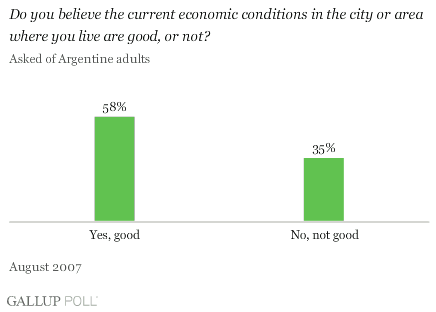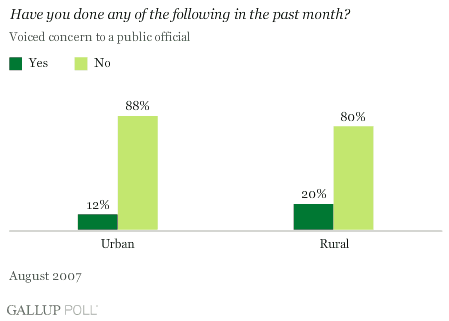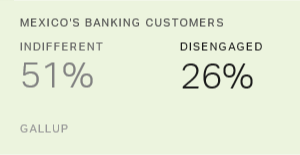WASHINGTON, D.C. -- Farmers in Argentina recently concluded a third round of strikes against higher export taxes in their country, where in 2007, 35% of respondents said the current economic conditions in their city or area were not good. Long-standing discontent persists in rural provinces, in part, because their growing economy has not translated into greater political voice.

Since March, Argentina's government, one of the world's leading exporters of corn, wheat, soya, and beef, has enforced a new sliding scale for export taxes on such farm products, in some cases boosting rates as high as 45%. The government introduced the tax increase as a way to raise federal revenue and dissuade farmers from selling food internationally that is needed domestically. President Cristina Fernandez de Kirchner has also argued that the new tax scale would help curb soaring inflation rates. But farmers have contended that the higher taxes reduce their profit margins and disrupted food deliveries in protest.
President Fernandez, who roundly won the election last October, now faces declining approval ratings. Poliarquía Consultores, an Argentine polling firm, reported her approval rating at 20% for June (a marked difference from her 57% approval rating in January). Pollsters contribute the decline, in large part, to the ongoing struggles with the Argentine farmers who benefited from former President Néstor Kirchner's fiscal policies that saved them from the country's financial crisis in 2001 and originally supported Fernandez.
The Voice of Concern
Considering the growing voice of dissent evident in the farm protests, the Gallup Poll found that rural respondents were nearly twice as likely as urban respondents to report having voiced their opinion to a public official within the last month.

Bottom Line
Considering the economic dissatisfaction and willingness to protest, the veracity and length of Argentina's farm strikes come with little surprise. Further, the Gallup Poll suggests that while a relatively small minority is physically protesting, a larger number may share their frustration. If protests resume, international attention could enervate investor confidence.
Survey Methods
Results are based on face-to-face interviews with 1,000 adults in Argentina, aged 15 and older, conducted in August 2007. For results based on the total sample of national adults, one can say with 95% confidence that the maximum margin of sampling error is ±3 percentage points. In addition to sampling error, question wording and practical difficulties in conducting surveys can introduce error or bias into the findings of public opinion polls.